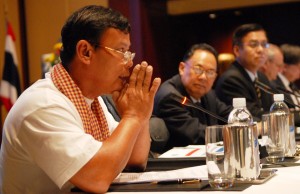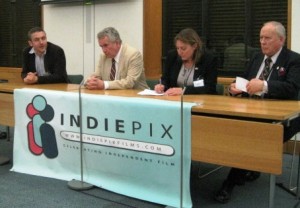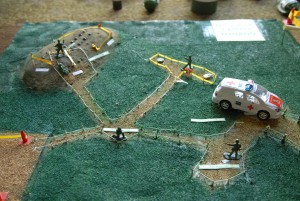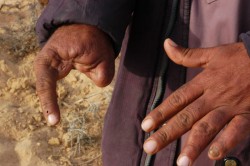Pursuing Peace in Italy (April 2003)
I was feeling a bit out of it after my flight to Rome. I looked out the window of the train taking me into the city and saw rainbow flags flying from balconies and windows of houses and apartments. They all had “PACE†on them.
What did it mean? Something to do with gay rights? Like PFLAG (Parents, Families and Friends of Lesbian and Gays)?
Finally it clicked: Pace. Paz. Paix. Peace. A fitting theme for my time spent in Rome earlier this month.
 Rome marked the culmination of a six-month’s work to produce our fifth annual report. The Italian government had agreed to pay to bring together our global network of researchers together to submit their updates for the report. Our partner, the Italian Campaign to Ban Landmines had volunteered to coordinate all aspects of the meeting. I was going a week ahead of the meeting to early to make sure it would all go as planned.
Rome marked the culmination of a six-month’s work to produce our fifth annual report. The Italian government had agreed to pay to bring together our global network of researchers together to submit their updates for the report. Our partner, the Italian Campaign to Ban Landmines had volunteered to coordinate all aspects of the meeting. I was going a week ahead of the meeting to early to make sure it would all go as planned.
I worked out of the campaign’s tiny office at the beginning with my colleagues Simona and Giuseppe speaking to me in an odd mix of English & Italian and me answering in English and sometimes Spanish. In Iraq, a story broke about deminers disarming and removing thousands of antipersonnel mines discovered stored in a mosque. I looked online at their photos. These were Italian-manufactured Valmara-69 antipersonnel mines, a particularly nasty-looking device the size of a tin can with three prongs coming off the top. Designed to jump up a meter before exploding, after wires coming from the prongs were tripped. Italy exported these mines by the millions in the late 1980s and early 1990s. We had our media hook for the opening press conference.
 As our participants started arriving from all over the world, I moved into the venue, a converted monastery in the south of the city. We met, slept, ate and partied in this place for three days straight. I awoke on the first day of the conference to see U.S. soldiers in Baghdad and the Republican Guard running away while stripping off their black uniforms. I wondered if we’d be able to stay focused on our discussions. By the end of the meeting, the U.S. seemed to be “winning†Baghdad. We took the participants outside for a group photograph. They posed with the PACE flags. Later we gave everyone a flag, which they dressed up in for the closing party.
As our participants started arriving from all over the world, I moved into the venue, a converted monastery in the south of the city. We met, slept, ate and partied in this place for three days straight. I awoke on the first day of the conference to see U.S. soldiers in Baghdad and the Republican Guard running away while stripping off their black uniforms. I wondered if we’d be able to stay focused on our discussions. By the end of the meeting, the U.S. seemed to be “winning†Baghdad. We took the participants outside for a group photograph. They posed with the PACE flags. Later we gave everyone a flag, which they dressed up in for the closing party.
For most of our people, the PACE message was more relevant to their situations back home and not the Iraq war. Conflicts simmering or continuing in countries like Armenia, Azerbaijan, Brazil, Burma, Burundi, Colombia, Egypt, Indonesia, Nepal, the Philippines, Serbia, Senegal, Sudan, Uganda, Venezuela and so on… But Iraq was the overriding theme of the week. We watched the bombs drop and knew the hard work was yet to be done. Who will clean up this mess of mines, cluster bombs and other explosive remnants of war? Why did it have to happen in the first place?
At this time in history, Italy was probably the most appropriate place we could have chosen to meet in peace about peace. Pace, pronounced pa-chey. Back in DC, my flag is flying from the balcony.













